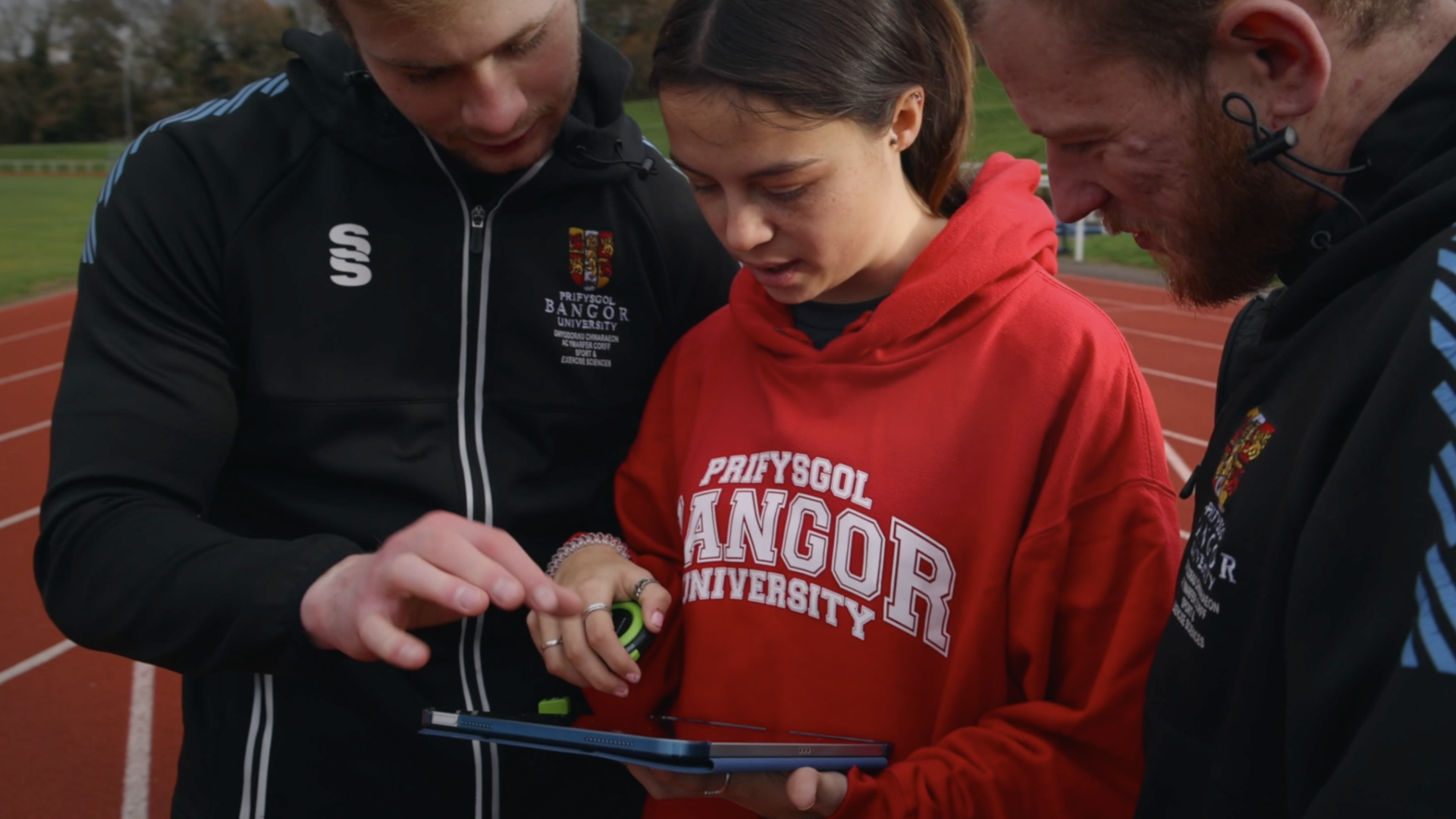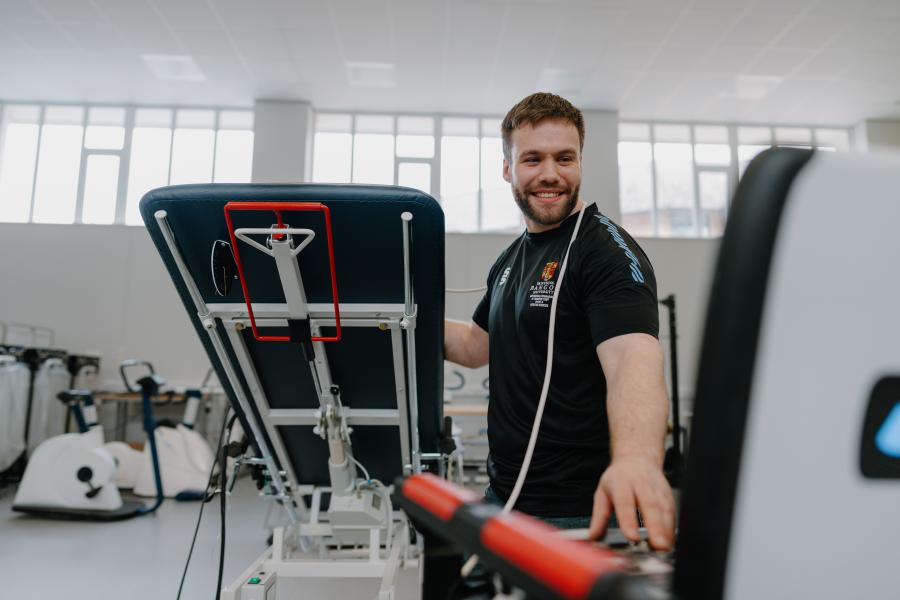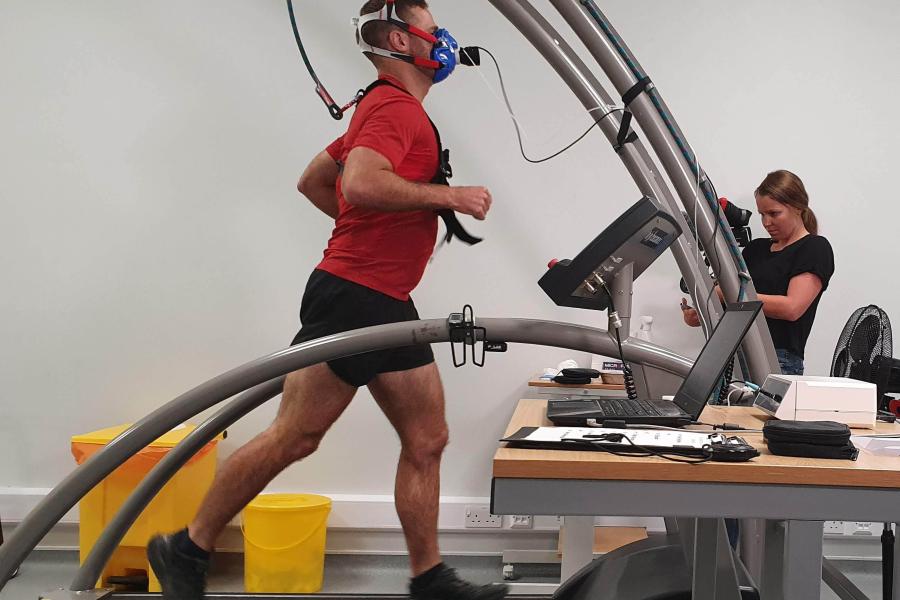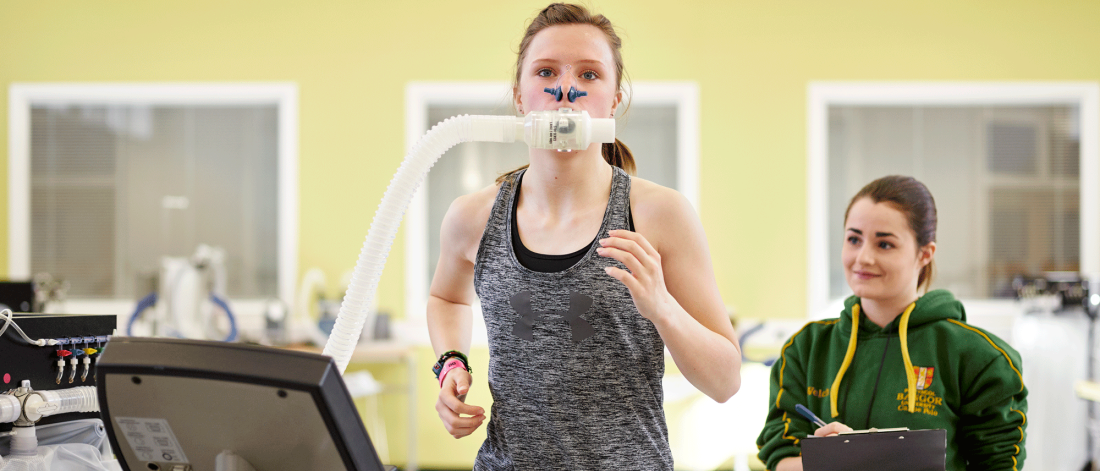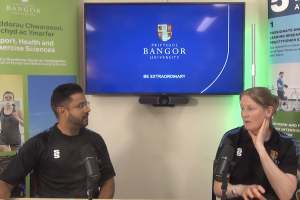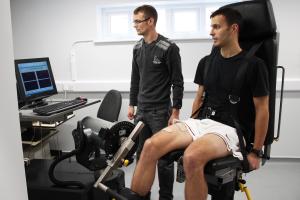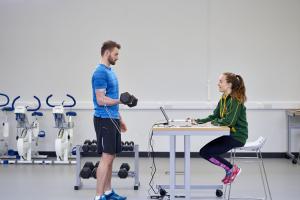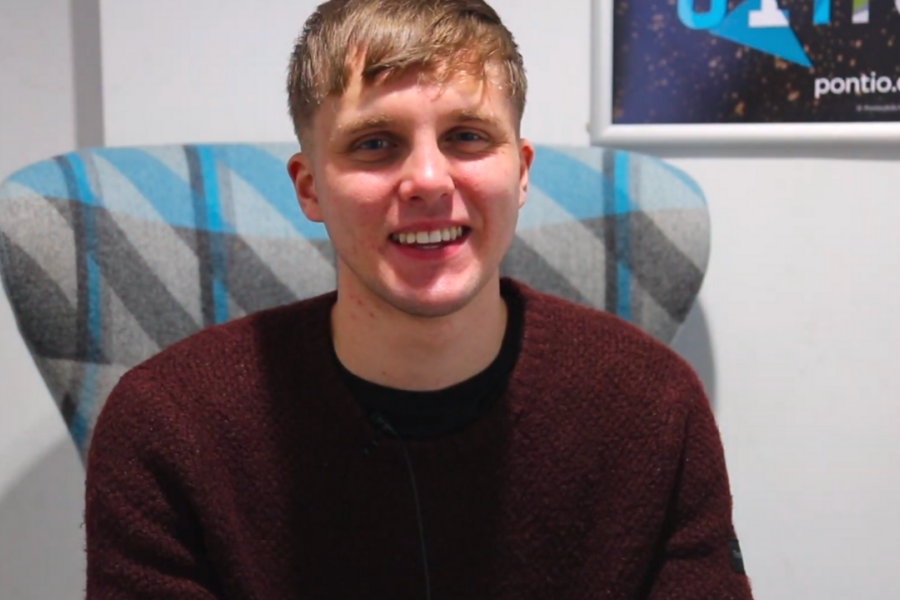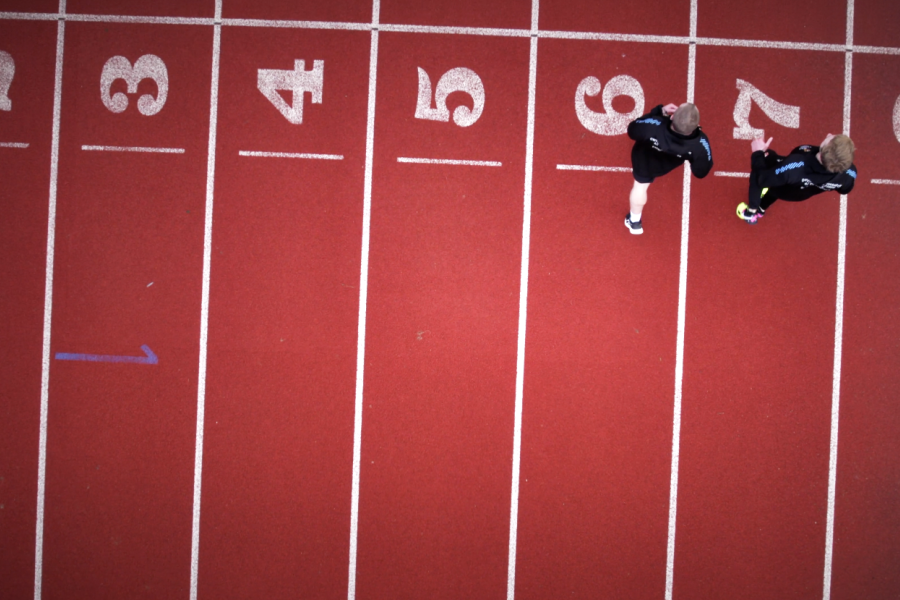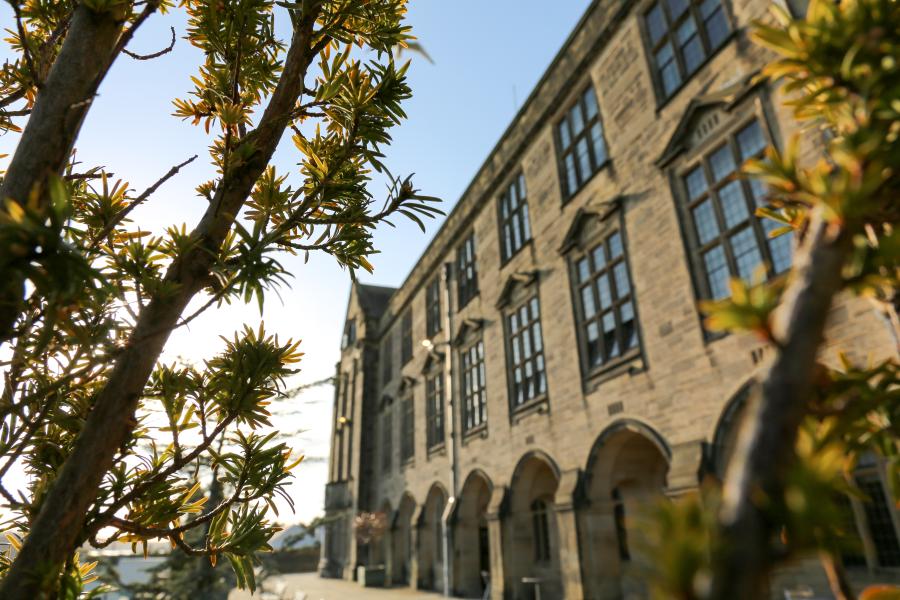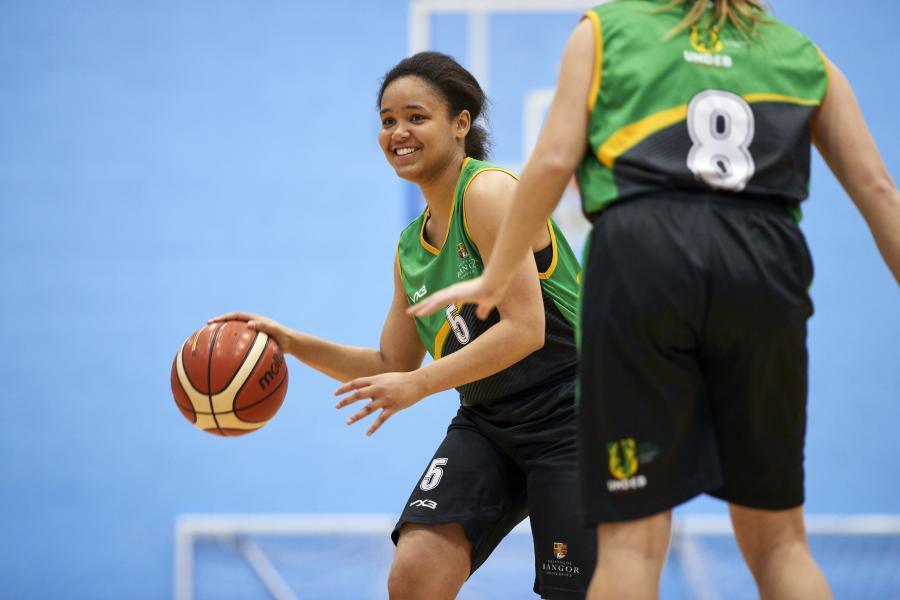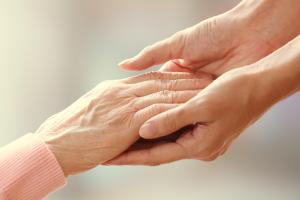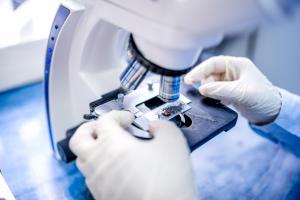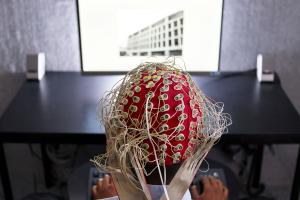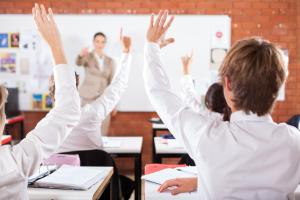Normal site campus
Unusually for such a high ranked sport science department, all your facilities are easily accessible in one space. Our teaching and lab buildings are all located on the Normal Site Campus helping to reduce your travel time and create a great community working and learning environment.
Sports Normal site lobby
This is the access hub to the departments Physical Activity and Well-Being centre, together with the onsite leisure facilities, including two sports halls and a small strength and conditioning space.
Canolfan PAWB (Physical Activity and Well-being) centre
You are now in the main corridor of the PAWB centre, where students have access to three separate teaching and research labs.
PAWB Physiology and teaching lab
Here is where you get direct practical experience using the most up-to-date sport and exercise science equipment. This regular hands-on experience helps set us apart from other top ranked sport science departments. You’ll get real world practical experience using the equipment in the same way the department does when working with organisations to investigate neuroscience, psychophysiology, sport psychology, personality, and physiology to answer future employers’ questions and have real impact. For example, how to measure exercise behaviour change? How to accurately measure patients, potential talent, and world class athletes’ physiology to help drive positive change for them? Or how to design and implement individualised pressure training programmes for high performance teams? Incidentally, the departments individualised pressure training programme was recently implemented with the England and Wales Cricket Board (ECB) and directly helped the England Men’s teams’ win the World Cup.
PAWB Physiology and teaching space 2
It is both important for all students to have practical hands on experience and that we continue to sit in the UK’s top 5 list for Sport Science departments, the PAWB centre houses a number of separate teaching and research spaces. Here is one specifically designed for health, pre- and rehab, and other aspects of medical based application of sport science knowledge.
PAWB Physiology and teaching space 3
In this teaching and research lab, the PAWB centre has a suite of S&C equipment, from free weights right through to treadmills that can work up to speeds faster than humans can typically run. The use cases for this is vast from simple warm ups to high performance testing.
Normal site sports hall corridor
All the facilities are just a short walk apart and often just a quick hop down a corridor.
Outside George building
Everything is designed with your studies in mind. We minimise travel challenges by housing your facilities in a simple to access space. This is the main Sport Science building where you can access staff offices, lecture theatres, more labs, together with a fantastic view of the Menai Straits!
Normal site sports hall
This is the larger of the two on site sports halls and contains full size basketball, 5 a side football, and netball courts, together with 4 badminton courts. This is used by students both for recreation activities, but also directly in modules and classes for practical sessions and research purposes.
Normal site gymnasium
On site we have two sports halls. In this, the smaller of the two, students and clubs can access the space for a variety of activities.
This is the main entrance of the George building
This is the main entrance of the George building. As a grade II listed building you can see it has a lot more character and soul than the typically new glass fronted buildings you’ll encounter in other institutions.
George lecture room corridor
On this wing of the George Building, you can access the two main teaching and lecture spaces.
George building octagonal room
In this lecture theatre, you’ll experience smaller group teaching and seminars. These enable you to develop your learning and knowledge and offer a smaller forum where discussion and challenge take place.
George building main lecture hall
This is the department's main lecture hall. This is where you’ll experience the traditional teaching method of a university and interact with the staff to gain the core aspects of your sport and exercise science degree.
George stairs
The George building is split over several levels. Once up the stairs, you can access the staff offices and additional research and teaching labs.
Staff office
The staff offices are in the same building as your lectures, and you won’t need a special card or code to access them. This means you can schedule tutorials and discuss your studies directly with staff in a safe and friendly environment and on an ad-hoc basis.
The George building lab corridor
The second floor houses another series of research and teaching labs where you have further access to world-class equipment.
Physiology Research lab 1
In the first of the George building physiology labs, you’ll find hundreds of pieces of equipment that are used for a multitude of purposes, from taking and analysing blood through to manipulating exercise and performance environments. The latter can be completed in this lab via the environmental chamber, where we can manipulate both room temperature (extreme heat to extreme cold) and humidity. This helps investigate how extreme environments impact human performance, e.g., Firefighters, athletes, rescue, and military personnel.
Physiology Research lab 2
Similar to the first of the two physiology labs in the George building, the octagonal houses hundreds of pieces of equipment, including an altitude (hypoxia) chamber.
Route to Padarn
It's just a short hop outside the Padarn labs and teaching spaces, where you’ll find the biochemistry, motion analysis, psychology, and motor control labs.
Padarn Biochemistry
In Padarn's biochemistry and prep labs, you’ll have access to all the equipment necessary for collecting and analysing the bodies' ‘chemistry’. Here, you can collect and analyse everything from hair samples through to blood, muscle tissue, and the body's cell structure.
Psychomotor lab
This is an example of one of our 7 separate psychology and psychomotor control labs. In these. you have access to equipment at your fingertips, including multiple electroencephalogram (EEG) and electrophysiology (ERP), eye tracking, manipulandum’s, graphics tablets, balance boards and even Magnetic Resonance Imaging (MRI) and brain simulation. All these will enable you to investigate and further your knowledge of sport and exercise science to a level that will stand you apart when you enter the workplace.
Padarn Motion analysis lab
In the motion analysis lab, you’ll have access to a 12 camera Vicon passive tracking system and an Optotrac active marker tracking system performance. Here you can really get to grips with developing your understanding of human movement to aid in your skill development surrounding performance analysis from the sports, health, and wider high-performance sectors.
Treborth
In addition to the excellent facilities on the Normal site, just a 5-minute walk between Telford’s famous Menai suspension bridge and Stephenson’s noted and picturesque original railway bridge - Britannia - you’ll have access to Treborth. This houses flood-lit 4G pitches and traditional grass pitches (football, rugby, hockey, even American football) together with a full-size athletics running track. Whilst you can access these facilities for general sport and leisure, you’ll also experience practical classes here where you can put what you learn in the lecture theatre into a real-world setting.

